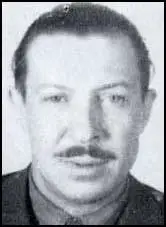Claude de Baissac

Claude de Baissac, the brother of Lise de Baissac, was born in Mauritius in 1907. During the Second World War they both joined the Special Operations Executive (SOE).
On 30th July 1942, Baissac and Harry Peulevé, were taken aboard a Halifax bomber and parachuted into France. Unfortunately they were dropped too low over Nimes and both men were badly injured. Baissac broke an ankle and Peulevé a leg. Baissac was able to remain in France but Peulevé was so badly injured he had to return to England.
Over the next few months Baissac created the Scientist Network in the Bordeaux area. Some of the group concentrated on attacking the submarine pens in the port and the rest operated in the rural Landes. By March 1943, Baissac told the SOE in London that he now had 11,000 men at his disposal.
Baissac worked closely with Francis Suttill and the Prosper Network in Paris. In May, 1943, Suttill warned Baissac that he feared a member of his network, Henri Dericourt, was working for the Germans. On 23rd June, 1943, the Gestapo captured Suttill and two senior members of the group. This was followed by the arrests of others involved in Prosper's activities. Baissac was brought back to England and soon afterwards members of the Scientist Network were arrested.
Baissac returned to France in February 1944 and after travelling to Chartres where he established a new network. During the Normandy landings Baissac joined with George Starr and the Wheelwright Network to attack the German defences.
Primary Sources
(1) Claude de Baissac was interviewed after the war about his activities in the Special Operations Executive (SOE).
I used the cover story provided for me by HQ, that of publicity agent. Provided that I lived extremely quietly and did not attract any particular attention, this rather vague profession was extremely useful, and at that time aroused no suspicion either with the French, or German police. I also gave several people to understand that I was engaged on minor black-market activities, as I was of the opinion that this would help me considerably as an alibi, should I be questioned in a snap control. The papers with which I been provided in London did not, however, pass police investigation, and I had a very lucky escape.
I was brought before a commissaire de police, who examined my papers with great thoroughness, and then asked me: "And how long have you been here? You should tell London to be more careful." The man was pro-Ally, and did not take any further action on the matter, but I naturally set about immediately to find better papers.

